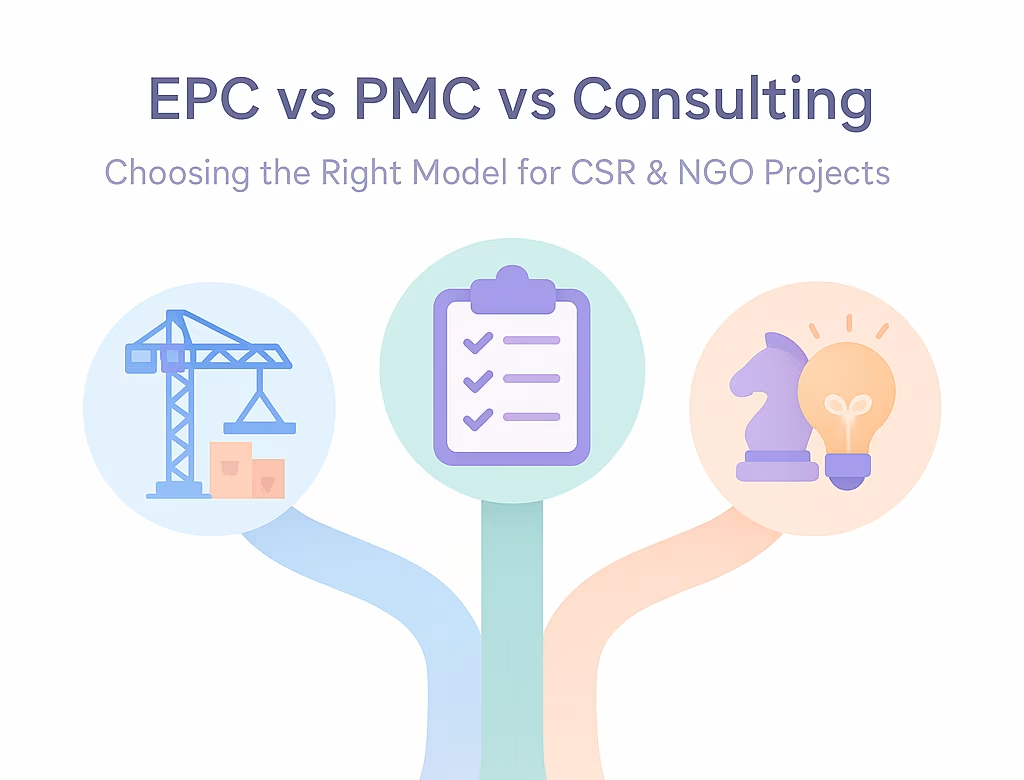EPC vs PMC vs Consulting: Best Model for CSR & NGO Projects

Table of content
Key Takeaways
- Affordable sustainability is doable for NGOs — it’s about smart design, not high budgets.
- Each intervention—whether passive cooling, rainwater harvesting, or modular green classrooms—delivers cost savings + social impact.
- For CSR funders, sustainable projects mean better compliance, ESG recognition, and visible community goodwill.
When non-profit organizations and CSR (Corporate Social Responsibility) teams invest in infrastructure projects—such as schools, hospitals, community centers, or vocational training institutes—the delivery model chosen can make or break project success.
Every rupee matters. In FY 2022–23, Indian companies spent ₹25,715 crore on CSR activities (MCA data), of which over 40% went into education, healthcare, and rural development infrastructure. These projects impact thousands of communities directly, so decisions around cost-efficiency, transparency, timelines, and quality are critical.
This is where understanding the differences between EPC (Engineering, Procurement & Construction), PMC (Project Management Consultancy), and Consulting/Advisory services becomes essential.
In this guide, we break down each model, highlight their advantages, risks, and ideal use cases, and explain why CSR leaders and NGOs must carefully select the right approach to ensure sustainability, compliance, and social ROI.
- Education Infrastructure Gaps: 27% of government schools in India still lack functional toilets, and over 20% don’t have access to electricity (UDISE+ 2022–23).
- Healthcare Shortfalls: India faces a shortfall of 23% PHCs and 28% CHCs (Rural Health Statistics 2022).
- Skill Development Needs: Less than 5% of India’s workforce has received formal vocational training (NSDC data).
For corporates and NGOs, filling these gaps through CSR-funded infrastructure projects is both an opportunity and a responsibility. But the choice of execution model—EPC, PMC, or Consulting—directly determines whether projects deliver long-term impact or become white elephants.
What it Means
EPC is a turnkey model where one contractor takes complete responsibility: design, procurement, and construction.
Why NGOs/CSR Teams Use EPC
- Speed: Meets short CSR timelines (many companies must spend CSR budgets before financial year-end).
- Simplicity: One vendor → less coordination.
- Predictability: Fixed-cost contracts reduce financial uncertainty.
Pros of EPC in CSR
- Single point of accountability.
- Fast-track delivery.
- Minimal management overhead for the NGO/corporate team.
Risks & Limitations
- Limited transparency in cost utilization.
- Low flexibility—community needs may evolve mid-project.
- Quality may be compromised if contractor cuts costs.
Best Use Cases:
School classrooms, sanitation units, small PHCs, community halls—projects that require speed and clear handover.
How NGOs can pitch for CSR Grants in India
What it Means
PMC acts as the funder’s representative. It does not build, but instead manages multiple contractors/vendors to deliver the project within defined time, cost, and quality parameters.
Why NGOs/CSR Teams Use PMC
- Transparency: Open bidding and vendor management.
- Quality Assurance: Independent monitoring of work and materials.
- Flexibility: Can adapt project scope to evolving community requirements.
Pros of PMC in CSR
- Detailed cost tracking—useful for CSR audit and compliance.
- Ability to ensure NABH compliance in hospitals or ECBC compliance in green buildings.
- Greater sustainability and O&M (operation & maintenance) planning.
Risks & Limitations
- Slower than EPC due to multiple stakeholders.
- Higher consultancy cost upfront.
- Requires funder involvement for approvals and decision-making.
Best Use Cases:
Hospitals, skill centers, renewable energy projects, multi-block campuses—where quality and sustainability matter more than just speed.
Hospital Construction Cost in India
What it Means
Consulting firms provide strategic, technical, and compliance advisory. They prepare Detailed Project Reports (DPRs), conduct feasibility studies, community needs assessments, and align projects with CSR Schedule VII and government schemes.
Why NGOs/CSR Teams Use Consulting
- To ensure the project is community-led, not top-down.
- To secure statutory approvals and align with CSR, 12A, 80G, FCRA norms.
- To design impact measurement frameworks.
Pros of Consulting in CSR
- Sector expertise (education, health, environment).
- Helps corporates avoid compliance violations.
- Ensures projects are scalable and replicable.
Risks & Limitations
- No execution role—only advisory.
- Recommendations only add value if implemented well.
Best Use Cases:
- Baseline surveys, DPR preparation, CSR strategy alignment, monitoring & evaluation (M&E), third-party audits.
- Small, time-bound infra projects → EPC
If your CSR mandate is to quickly deliver classrooms, PHCs, or sanitation blocks, EPC ensures speed and accountability. - Large, complex, multi-vendor projects → PMC
For hospitals, skilling centers, renewable energy, or rural infra clusters, PMC ensures quality, compliance, and sustainability. - Strategic or policy-driven projects → Consulting
For feasibility studies, community needs assessments, or monitoring frameworks, consulting adds maximum value. - Hybrid Approach
Many CSR projects succeed with a hybrid model:- Consultant develops DPR + compliance frameworks.
- PMC ensures transparent and quality execution.
- EPC/vendor delivers physical infrastructure.
- Consultant develops DPR + compliance frameworks.
Learn how to build patient centric hospital in India
Q1. Which model ensures maximum transparency for CSR audits?
PMC offers the highest transparency since it involves open vendor management and detailed cost tracking.
Q2. What’s the cheapest model for small CSR projects?
EPC is cost-effective for small, time-bound projects like sanitation units or classrooms.
Q3. Why do CSR funders need consultants?
Consultants help align projects with CSR Schedule VII, avoid compliance risks, and set up impact measurement frameworks.
Q4. Can a CSR project combine EPC, PMC, and Consulting?
Yes. Many corporates use a hybrid model—Consultants plan, PMC monitors, and EPC executes.
Q5. Which model is best for healthcare projects?
PMC is preferred for hospitals since it ensures compliance (NABH, medical equipment standards) and quality control.
CSR and NGO projects in India carry high community impact and compliance accountability. Whether it’s bridging gaps in schools, building NABH-ready hospitals, or powering rural villages with renewable energy, the choice of execution model—EPC, PMC, or Consulting—defines both impact and credibility.
- EPC is best for speed and turnkey delivery.
- PMC ensures quality, transparency, and long-term value.
- Consulting enables better planning, compliance, and measurement.
At BuiltX, we work exclusively with NGOs and non-profit projects. Our PMC-led approach ensures:
- Transparent procurement and competitive bidding.
- Sustainable, energy-efficient design and construction.
- Community-focused project delivery with zero compromises on quality.
- Long-term value for every rupee spent.
Whether you are planning a CSR-funded hospital, rural school, or community center, we guide you from planning to execution with an NGO-first approach. Contact us now
